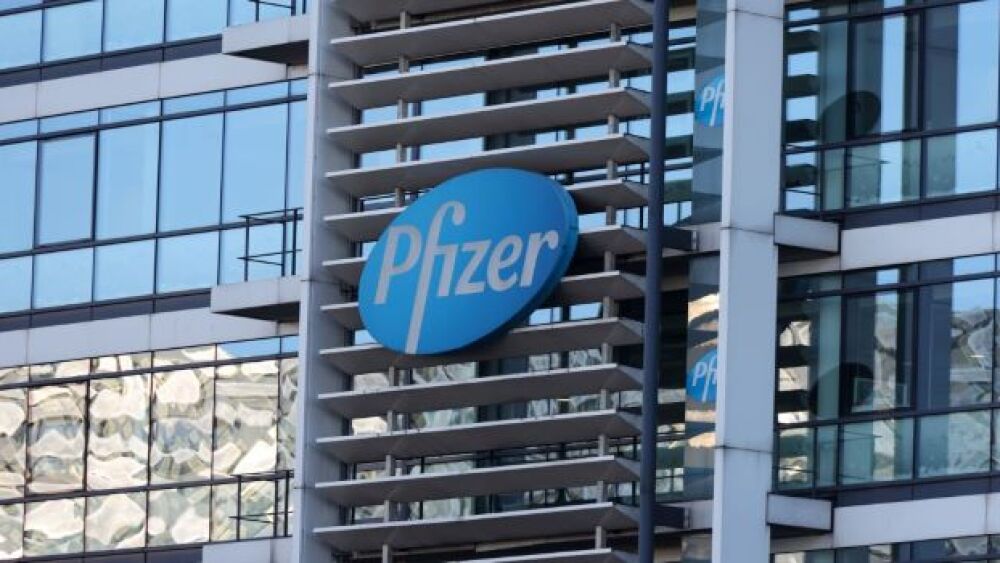Pfizer announced its RSV vaccine candidate PF-06482077 or RSVpreF, received Breakthrough Therapy designation from the U.S. Food and Drug Administration.
Pierre Suu/Getty Images
Pfizer notched another win with its vaccine development, this time for the respiratory syncytial virus (RSV) instead of COVID-19. The company announced its RSV vaccine candidate PF-06482077 or RSVpreF, received Breakthrough Therapy designation from the U.S. Food and Drug Administration.
The designation was granted to prevent the virus-associated lower respiratory tract illness in infants from birth up to six months of age through the active immunization of pregnant women. It comes days after GlaxoSmithKline was forced to halt enrolment and vaccination in three paused clinical trials assessing a vaccine candidate in pregnant women.
For Pfizer’s vaccine, the FDA decision was based on a Phase IIb proof-of-concept study conducted in healthy pregnant women ages 18 through 49 years old. The women received the RSV vaccine between 28 and 36 weeks of gestation. Data on this study has not yet been published. RSVpreF previously earned Fast Track designation from the FDA as well.
However, other clinical data shows that Pfizer’s RSVpreF is a promising vaccine candidate. The vaccine candidate is composed of two preF proteins that Pfizer selected to optimize protection against RSV A and B. Pfizer launched a Phase III study assessing RSVpreF in pregnant women two years ago. A trial readout is expected in the first half of this year.
In addition to studying RSVpreF in maternal women, the company is also assessing the candidate in older adults. Last year, Pfizer launched the Phase III RENOIR study evaluating the candidate in adults 60 and older. Topline data is expected in the first half of this year as well.
Kathrin U. Jansen, Ph.D., senior vice president and head of Vaccine Research & Development at Pfizer, called the Breakthrough Therapy designation a “pivotal next step” in the company’s goal of winning regulatory approval for the maternal vaccine candidate. Jansen also noted that the title is also an important milestone in developing a vaccine to mitigate the concerns of RSV in infants.
“If approved by the FDA, this maternal immunization has the potential to be the first vaccine candidate to help protect infants in their vulnerable first months of life from disease caused by this highly-contagious virus,” Jansen said in a statement. “We look forward to our ongoing dialogue with the FDA to accelerate the development of our maternal RSV vaccine candidate.”
RSV is a leading cause of bronchitis and pneumonia, and one of the most common infections in the world. Public health officials view the virus as a significant public health threat, particularly for infants and older adults who are most vulnerable. Data from the U.S. Centers for Disease Control and Prevention shows that RSV leads to 177,000 hospitalizations and about 14,000 deaths in adults over 65 each year. Globally, the infection rate is much higher. According to the World Health Organization, there are about 64 million infections each year, with approximately 166,000 resulting deaths.
Companies are racing to develop RSV vaccines due to the significant market demand. By 2027, the market for RSV is expected to be more than $4 billion. Companies such as GSK, Pfizer, Johnson & Johnson, AstraZeneca, Moderna and Novavax are all assessing potential RSV vaccines.
Last month, Moderna was cleared to move ahead with its Phase III study of an RSV vaccine candidate for older adults. Moderna’s MRNA-1345 is designed to work against RSV encoding for a prefusion F glycoprotein. MRNA-1345 has received Fast Track designation.
Featured Jobs on BioSpace





